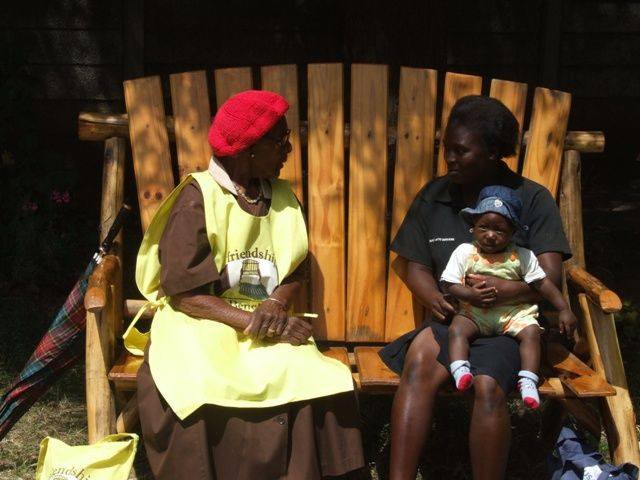Are ‘Friendship Benches’ The Cure For Depression, Anxiety In Poor Countries?

If you're anxious or depressed, talking things out can do wonders for emotional and mental health, even if the friendly ear listening is not attached to a licensed psychiatrist.
People in low-income areas and countries are not immune to the mental disorders that also afflict their wealthier counterparts, but their access to proper medical care is limited. A new study in the Journal of the American Medical Association may have the solution: Friendship Benches. The initiative is described as “six sessions of individual problem-solving therapy delivered by trained, supervised [lay health workers]” — who are trained to offer support but are not formally licensed — as well as optional peer support. In a trial in Zimbabwe, adults with common mental disorders who received the weekly treatment saw an improvement in symptoms as compared to a control group that did not.
Read: Natural Ways to Improve Mental Health
“Depression and anxiety are common mental disorders globally but are rarely recognized or treated in low-income settings,” the study says, estimating that a quarter of Zimbabwe has such disorders. “Task-shifting of mental health care to lay health workers (LHWs) might decrease the treatment gap.”
Grand Challenges Canada, a group funded by the Canadian government that invests in global health initiatives, explained in a statement that the lay health workers are known in their communities as “grandmothers” and have been trained to listen to patients with mental disorders like anxiety and depression and offer support. “Their offices are simple wooden seats, called Friendship Benches, located in the grounds of health clinics around Harare and other major cities in Zimbabwe.”
The problem-solving the “grandmothers” offered was geared toward “opening up the mind, uplifting the individual, and further strengthening,” the statement said. Six months after treatment patients with anxiety and depression were three times less likely to have depression symptoms, four times less likely to have anxiety symptoms and five times less likely to have suicidal thoughts. And the treatment helped some of Zimbabwe’s more vulnerable citizens: “86 percent of the study's participants were women, over 40 percent were HIV positive, and 70 percent had experienced domestic violence or physical illness.”
Researchers have long shown that talk therapy can be effective for people with certain mental conditions. The National Institute of Mental Health lists the possible benefits as helping to identify harmful or self-defeating ideas about yourself and learning ways to cope with stress, among others.
The researchers on the study — who were funded through Grand Challenges Canada and were from University of Zimbabwe, the London School of Hygiene & Tropical Medicine and King's College London — are looking at broadening their model, with the hopes of reaching young people and refugees. But the Friendship Bench program has already helped many more than just the 573 patients involved in the trial, as it has been expanded to more clinics and an estimated 27,500 people have already accessed the treatment. Zimbabwe’s 15 million people only have 25 psychiatrists and psychologists, so the program offers help to people who otherwise may never have received any.
“Through collaborating with a Médecins Sans Frontières [Doctors Without Borders] psychiatric program in Zimbabwe, the Friendship Bench is working to create the largest comprehensive mental health program in sub-Saharan Africa,” the statement said.
The Friendship Bench co-founder Dr. Dixon Chibanda, the study’s lead author, was quoted as saying that common mental disorders are an issue all over that region. “The Friendship Bench empowers people to achieve a greater sense of coping and control over their lives by teaching them a structured way to identify problems and find workable solutions.”
Source: Chibanda D, Weiss HA, Verhey R, et al. Effect of a Primary Care–Based Psychological Intervention on Symptoms of Common Mental Disorders in Zimbabwe: A Randomized Clinical Trial. Journal of the American Medical Association. 2016.
See also:
Published by Medicaldaily.com



























